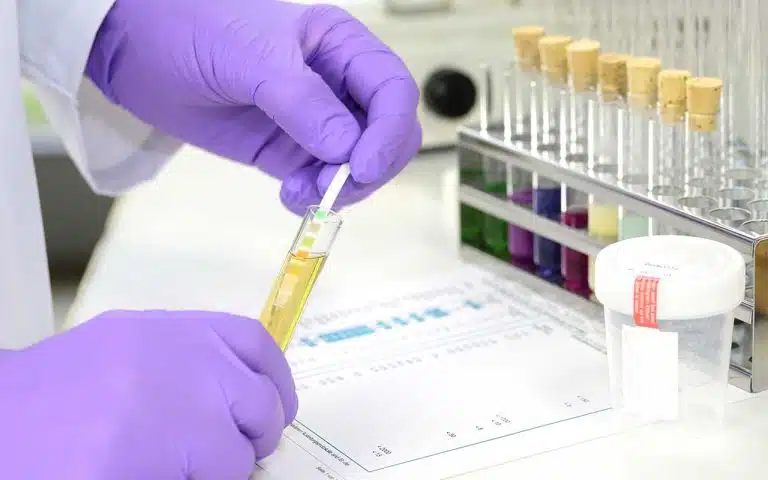How Long Do Opioids/Opiates Stay In Your System?

The amount of time opioids and opiates stay in your system can vary. Depending on the substance, an opioid can stay in your system for anywhere between 7.5 to 60 hours after the last dose.
Drug tests can detect traces of opioids in your body for up to 90 days after the last dose, even after the drug has mostly left your body. Many factors affect whether opioids stay in your system for shorter or longer periods of time.
Average Detection Times For Common Opioids
Many different factors affect how long opioids stay in your system. These factors include how the opioid is broken down by the body and whether it is an immediate-release or extended-release opioid.
Opioids can offer pain relief for a short time but can stay in your system even after their effects have worn off. The average length of time common opioids stay in your system are as follows.
Hydrocodone
Hydrocodone, a semi-synthetic opioid, stays in your system between 20 to 35 hours after it is taken. Hydrocodone has immediate-release and extended-release prescriptions.
Oxycodone
Oxycodone, a semi-synthetic opioid, stays in your system for between 16 to 40 hours after the last dose. Immediate-release oxycodone stays in the body for a shorter amount of time, while extended-release oxycodone stays in the body for longer.
Codeine
Codeine, a natural opiate, can stay in your system for 12.5 to 17.5 hours after it is taken. Part of codeine is broken down in the liver to become morphine. Drug testing that finds morphine in the body may be a sign of recent codeine or morphine use.
Fentanyl
Fentanyl, a powerful synthetic opioid drug, can stay in your system anywhere between 25 to 60 hours after it is administered. Elimination times for fentanyl can vary depending on the type of fentanyl and how it is taken.
Fentanyl’s long half-life adds to its high potential for drug abuse.
Morphine
Morphine stays in your system for about 7.5 hours after last use. Some studies suggest that morphine can stay for much longer if the person taking it has serious health problems.
Half-Life & Drug Detection Times
Half-life refers to how long it takes for a drug to decrease to half its maximum concentration after ingestion or injection.
The half-life of a substance can be used to find out how long a substance stays in the body. After 5 half-life cycles, almost all of a substance is eliminated from the body.
Many factors can affect half-life and elimination times, including:
- body fat percentage
- diet
- metabolism
- drug tolerance
- time since last use of the drug
Types Of Opioid/Opiate Drug Tests
Drug tests look for specific metabolites in the body which indicate recent drug use or even drug abuse. Different parts of the body usually have different detection windows.
A drug test may be done by an employer to make sure you are fit to work, or by doctors who need to confirm you are taking prescription drugs as directed.
Traditional drug tests may not pick up metabolites for newer opioids. Your employer or healthcare provider may need a test specifically designed to pick up these novel drugs.
Urine Tests
Urine tests are a common way to test for drugs. Opioid metabolites can be found in urine for about 2 to 3 days after the last dose.
Some urine tests are not designed to pick up synthetic opioids such as fentanyl, tramadol, and hydromorphone.
Blood Tests
Blood tests usually have a detection window of less than a day after the last dose. A blood test is most effective if a person has drugs in their body at the time of testing.
Saliva Tests
If an opioid is taken orally, a saliva test can detect it for about 1 to 1.5 days after it is taken. Saliva tests likely involve a cheek swab or saliva that is taken directly from the mouth.
Hair Tests
Opioid metabolites can be found in hair follicles for up to 90 days after the last dose.
Opioid Detox & Treatment
Many opioids have legally approved brand names for medical use. However, many of them are controlled substances which can be banned in the workplace or other environments.
If you or a loved one test positive for opioids, there are resources out there. Your body may be used to having opioids in your system, and a detox may be needed to safely flush the drug out.
To learn about professional treatment programs that can help you overcome addiction and dependence, please contact us today.
Written by Ark Behavioral Health Editorial Team
©2024 Ark National Holdings, LLC. | All Rights Reserved.
This page does not provide medical advice.
Centers for Disease Control and Prevention - Urine Drug Testing
LabCorp - Blood Drug Testing
LabCorp - Drug detection times | Frequently Asked Questions (FAQs)
National Library of Medicine - Codeine | C18H21NO3
National Library of Medicine - Fentanyl | C22H28N2O
National Library of Medicine - Hydrocodone | C18H21NO3
National Library of Medicine - Morphine | C17H19NO3
National Library of Medicine - Oxycodone | C18H21NO4

Questions About Treatment?
Ark Behavioral Health offers 100% confidential substance abuse assessment and treatment placement tailored to your individual needs. Achieve long-term recovery.
100% confidential. We respect your privacy.
Prefer Texting?
Our friendly support team is here to chat 24/7. Opt out any time.







 Learn More
Learn More








